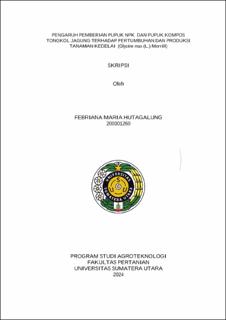Pengaruh Pemberian Pupuk Npk dan Pupuk Kompos Tongkol Jagung terhadap Pertumbuhan dan Produksi Tanaman Kedelai (Glycine Max (L.) Merrill)
Effect of NPK Fertilizer and Corn Cob Compost Fertilizer on the Growth and Production of Soybean Plants (Glycine max (L.) Merrill)

Date
2024Author
Hutagalung, Febriana Maria
Advisor(s)
Ginting, Jonatan
Metadata
Show full item recordAbstract
Soybeans are a legume which is a source of vegetable protein which is good for health. Soybean seeds have nutritional content consisting of 40-45% protein, 18% fat, 24-36% carbohydrates, 8% water content, amino acids and other nutritional contents that are beneficial for humans. To increase production, it is necessary to apply NPK fertilizer. Apart from that, soybean production can also be increased by providing corn cob compost. This research was carried out on Jl. Roses XVI No. 14, Medan Selayang District, Medan City, North Sumatra. At an altitude of ±25 above sea level. This research was conducted from February 2024 to August 2024. This research used a Randomized Block Design with two treatment factors, namely the application of Phonska NPK fertilizer: 0, 250, 500 kg/ha. The second factor is the provision of corn cob compost: 0, 10, 20, 30 tonnes/ha. Providing NPK fertilizer significantly increased plant height, root wet weight, shoot wet weight, root dry weight, shoot dry weight, number of productive branches, number of productive pods, seed dry weight per sample, dry weight of 100 seeds and seed dry weight per plot. Providing corn cob compost significantly increased plant height, number of primary branches, dry weight of seeds per sample, dry weight of 100 seeds and dry weight of seeds per plot. The interaction between NPK fertilizer and corncob compost was not real on all parameters observed.
Collections
- Undergraduate Theses [3571]
